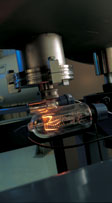 
Dawn
of a New Machine
(continued)
The
work constitutes a giant step forward for the fields of human toxicology
and cancer control. With the power of the AMS, Dingley traced the
path of a realistic human dose of a potential carcinogen as it moves
through a living human being. Dingley showed that the carcinogen
rapidly reached a cancer site and lurked there for several days
as it infiltrated and damaged DNA.
Realistic doses in real people. It’s a big improvement over
the common way of testing a suspected carcinogen — giving
megadoses of the substance to laboratory rodents, and waiting to
see if the animals develop cancer.
Dingley is also using the AMS to look at cancer prevention: Can
anti-cancer compounds, like those found in fruits and vegetables,
help to prevent the kind of DNA damage caused by carcinogens like
PhIP?
To find out, she fed various anti-cancer compounds — including
isothiocyanates, found in broccoli and other cruciferous vegetables,
and chlorophyllin, found in green, leafy veggies — to laboratory
animals for two weeks. Then she gave the animals PhIP.
The AMS revealed that in animals pre-treated with the anti-cancer
compounds, less PhIP reached the tissues, and less DNA damage was
done.
“We found a sound, scientific reason why eating fruits and
vegetables is good for you,” Dingley said.
In other AMS-based research, Turteltaub and Dingley are teaming
up with David Gandara, associate director for clinical research
at UC Davis Cancer Center, to trace chemotherapy drugs in the body.
The idea: to determine whether a chemotherapy drug is reaching a
target tumor, and, if so, in what quantity.
  

Home |
Table of Contents |
To our Readers |
Building on Basics
Focusing on Patients |
In Translation |
First Steps
Campus Connection |
Benefactors |
News in Brief
UC Davis Health System |
© 2000, 2001, 2002 UC Regents. All rights reserved.
|
 |



 

The
Accelerator Mass Spectrometer, or AMS.
|


